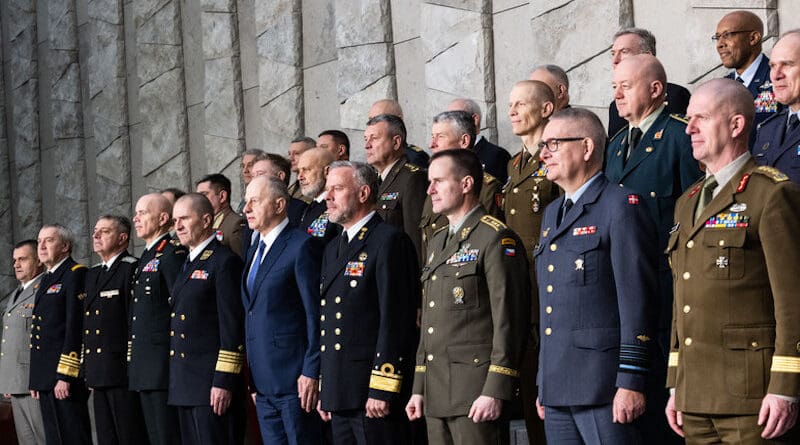NATO Chiefs Of Defence Discuss Deterrence And Defence Priorities
From 17 to 18 January 2024, the NATO Military Committee in Chiefs of Defence Session took place at NATO Headquarters in Brussels. The 31 Allied Chiefs of Defence and Invitee Sweden focused on the executability the Alliance’s new defence plans, NATO’s warfighting transformation, NATO’s continued support to Ukraine and military cooperation with NATO Partners Austria, Australia, Ireland, Japan, New Zealand, Switzerland, and the Republic of Korea. During the two-day meeting, the Chiefs of Defence met for the first time in a NATO-Ukraine Council format.
Opening the NATO Military Committee session alongside NATO Deputy Secretary General Mircea Geoană, Chair of the Military Committee Admiral Rob Bauer stressed that the rules-based international order is under immense pressure: “The tectonic plates of power are shifting. And as a result we face the most dangerous world in decades. In this new era of collective defence we must defend not only the physical safety of our 1 billion people and 31 (soon to be 32) nations, we are defending freedom and democracy”.
The Deputy Secretary General, Mr. Geoană highlighted various global security challenges: “Today, our peace is threatened. War, terrorism, instability. Authoritarian states threaten our values. We need a strong NATO more than ever and a strong NATO is what we have.”
The first session saw General Cavoli, Supreme Allied Commander Europe – SACEUR, brief on the executability of the DDA Family of Plans and the way ahead regarding NATO’s deterrence and defence posture. Allies are actively working on making the new defence plans fully executable.
Regarding NATO’s warfighting transformation, Supreme Allied Commander Transformation General Lavigne and Deputy Supreme Allied Commander Transformation General Badia updated the Chiefs of Defence on the progress regarding NATO’s transformation, focusing on the future of multi domain operations and the adaptation of NATO’s Command and Control.
The session of Integrated Air and Missile defence saw the Chiefs of Defence discuss the improvement of NATO’s readiness and interoperability in the Air domain.
The afternoon saw the Chiefs of Defence discuss and provide additional guidance to the two Strategic Commanders regarding NATO’s deterrence and defence priorities ahead of the Washington D.C. The new defence plans require more people, more training and exercising, more stockpiles and capabilities, and more planning defence investment.
In the inaugural NATO-Ukraine Council in Chiefs of Defence format, the Ukrainian Military Representative to NATO, Major General Serhii Salkutsan briefed the NATO Chiefs of Defence on behalf of Ukrainian Chief of Defence General Zaluzhnyi. Praising the bravery and determination of the Ukrainian Armed Forces, the Chiefs of Defence reaffirmed their unwavering and continued support to Ukraine. Admiral Bauer stipulated: “The outcome of this war will determine the fate of the world. Our support is not charity; it is an investment in our security.”
The second day began with the Military Committee gathering with the Chiefs of Defence from the Partner Interoperability Advocacy Group: Australia, Austria, Ireland, New Zealand and Switzerland. The PIAG Nations hold non-NATO Nation Status, which grants an individual security agreement that allows the exchange of classified information and participation in NATO training and exercises. The Chiefs of Defence stated that the current security environment clearly demonstrates the increased importance of cooperation with Partners, especially regarding interoperability.
Meeting with their Indo-Pacific partners Australia, Japan, New Zealand and South Korea, the NATO Chiefs of Defence discussed how regional security issues are increasingly becoming global security issues. Together, they discussed how to develop further training and exercising opportunities amidst closer cooperation.
The final session of the day saw the Chiefs of Defence meet with the NATO Secretary General, Mr. Jens Stoltenberg. The Chiefs of Defence discussed global security issues and the political priorities ahead of the Washington D.C. Summit.

